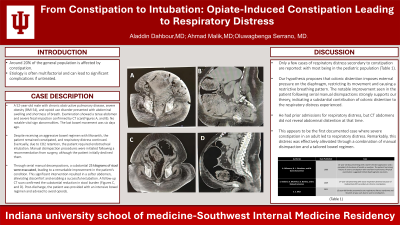Tuesday Poster Session
Category: Colon
P3101 - From Constipation to Intubation: Opiate Induced Constipation Leading to Respiratory Distress
Tuesday, October 24, 2023
10:30 AM - 4:00 PM PT
Location: Exhibit Hall

Has Audio
- AD
Aladdin Dahbour, MD
Indiana University
Evansville, Indiana
Presenting Author(s)
Aladdin Dahbour, MD1, Oluwagbenga Serrano, FACG2, Ahmad Malik, MD3
1Indiana University, Evansville, IN; 2Indiana University, Vincennes, IN; 3Indiana University School of Medicine, Evansville, IN
Introduction: Around 20% of the general population is affected by constipation. Etiology is often multifactorial and can lead to significant complications if untreated. We present an adult male with severe constipation that led to respiratory distress requiring endotracheal intubation due to the physical restriction of diaphragmatic movement.
Case Description/Methods: A 52-year-old male with a history of chronic obstructive pulmonary disease requiring 2L supplemental oxygen, BMI 54, and opioid use disorder presented to our hospital with abdominal swelling and shortness of breath. His last bowel movement occurred six days prior. Vital signs were unremarkable. Physical examination revealed a taught abdomen, hypoactive bowel sounds, and no tenderness to palpation. Labs were unremarkable throughout his stay. Computed tomography (CT) abdomen/pelvis showed a large volume of formed colonic fecal debris and severe fecal impaction.
The patient received an aggressive bowel regimen. He began having bowel movements; however, oral laxatives and enemas eventually became ineffective. Gastroenterology assisted, but he remained obstipated, despite using movantik. His respiratory distress did not improve. Arterial blood gas showed CO2 retention. Non-invasive breathing measures were ineffective, and he eventually required endotracheal intubation.
Serial manual disimpactions were recommended by general surgery, after which approximately 25kg of stool was evacuated. The patient's abdomen became softer and less distended. He improved clinically and was successfully extubated. Repeat CT abdomen showed interval improvement in stool burden and colonic caliber. He was discharged with an aggressive bowel regimen and was advised to avoid all opioids.
Discussion: Only a few cases of respiratory distress secondary to constipation are reported: with most being in the pediatric population.Our hypothesis suggests that bowel distention exerts external pressure on the diaphragm, limiting its excursion and causing a restrictive breathing pattern. Our patient's significant improvement with serial manual disimpactions suggests that colonic distention played a significant role in his respiratory distress. He had prior admissions for respiratory distress, but CT abdomens did not reveal abdominal distention at that time. To the best of our knowledge, this is the first known case of severe constipation in an adult causing respiratory distress, which was successfully treated with manual disimpaction and a bowel regimen.

Disclosures:
Aladdin Dahbour, MD1, Oluwagbenga Serrano, FACG2, Ahmad Malik, MD3. P3101 - From Constipation to Intubation: Opiate Induced Constipation Leading to Respiratory Distress, ACG 2023 Annual Scientific Meeting Abstracts. Vancouver, BC, Canada: American College of Gastroenterology.
1Indiana University, Evansville, IN; 2Indiana University, Vincennes, IN; 3Indiana University School of Medicine, Evansville, IN
Introduction: Around 20% of the general population is affected by constipation. Etiology is often multifactorial and can lead to significant complications if untreated. We present an adult male with severe constipation that led to respiratory distress requiring endotracheal intubation due to the physical restriction of diaphragmatic movement.
Case Description/Methods: A 52-year-old male with a history of chronic obstructive pulmonary disease requiring 2L supplemental oxygen, BMI 54, and opioid use disorder presented to our hospital with abdominal swelling and shortness of breath. His last bowel movement occurred six days prior. Vital signs were unremarkable. Physical examination revealed a taught abdomen, hypoactive bowel sounds, and no tenderness to palpation. Labs were unremarkable throughout his stay. Computed tomography (CT) abdomen/pelvis showed a large volume of formed colonic fecal debris and severe fecal impaction.
The patient received an aggressive bowel regimen. He began having bowel movements; however, oral laxatives and enemas eventually became ineffective. Gastroenterology assisted, but he remained obstipated, despite using movantik. His respiratory distress did not improve. Arterial blood gas showed CO2 retention. Non-invasive breathing measures were ineffective, and he eventually required endotracheal intubation.
Serial manual disimpactions were recommended by general surgery, after which approximately 25kg of stool was evacuated. The patient's abdomen became softer and less distended. He improved clinically and was successfully extubated. Repeat CT abdomen showed interval improvement in stool burden and colonic caliber. He was discharged with an aggressive bowel regimen and was advised to avoid all opioids.
Discussion: Only a few cases of respiratory distress secondary to constipation are reported: with most being in the pediatric population.Our hypothesis suggests that bowel distention exerts external pressure on the diaphragm, limiting its excursion and causing a restrictive breathing pattern. Our patient's significant improvement with serial manual disimpactions suggests that colonic distention played a significant role in his respiratory distress. He had prior admissions for respiratory distress, but CT abdomens did not reveal abdominal distention at that time. To the best of our knowledge, this is the first known case of severe constipation in an adult causing respiratory distress, which was successfully treated with manual disimpaction and a bowel regimen.

Figure: A , B : Extreme fecal impaction throughout the colon. in both axial and sagittal (respectively) sections of Abdomen CT ( before disimpaction)
C, D : Decreased colonic stool burden in both axial and sagittal (respectively) sections of Abdomen CT ( after disimpaction)
C, D : Decreased colonic stool burden in both axial and sagittal (respectively) sections of Abdomen CT ( after disimpaction)
Disclosures:
Aladdin Dahbour indicated no relevant financial relationships.
Oluwagbenga Serrano indicated no relevant financial relationships.
Ahmad Malik indicated no relevant financial relationships.
Aladdin Dahbour, MD1, Oluwagbenga Serrano, FACG2, Ahmad Malik, MD3. P3101 - From Constipation to Intubation: Opiate Induced Constipation Leading to Respiratory Distress, ACG 2023 Annual Scientific Meeting Abstracts. Vancouver, BC, Canada: American College of Gastroenterology.
